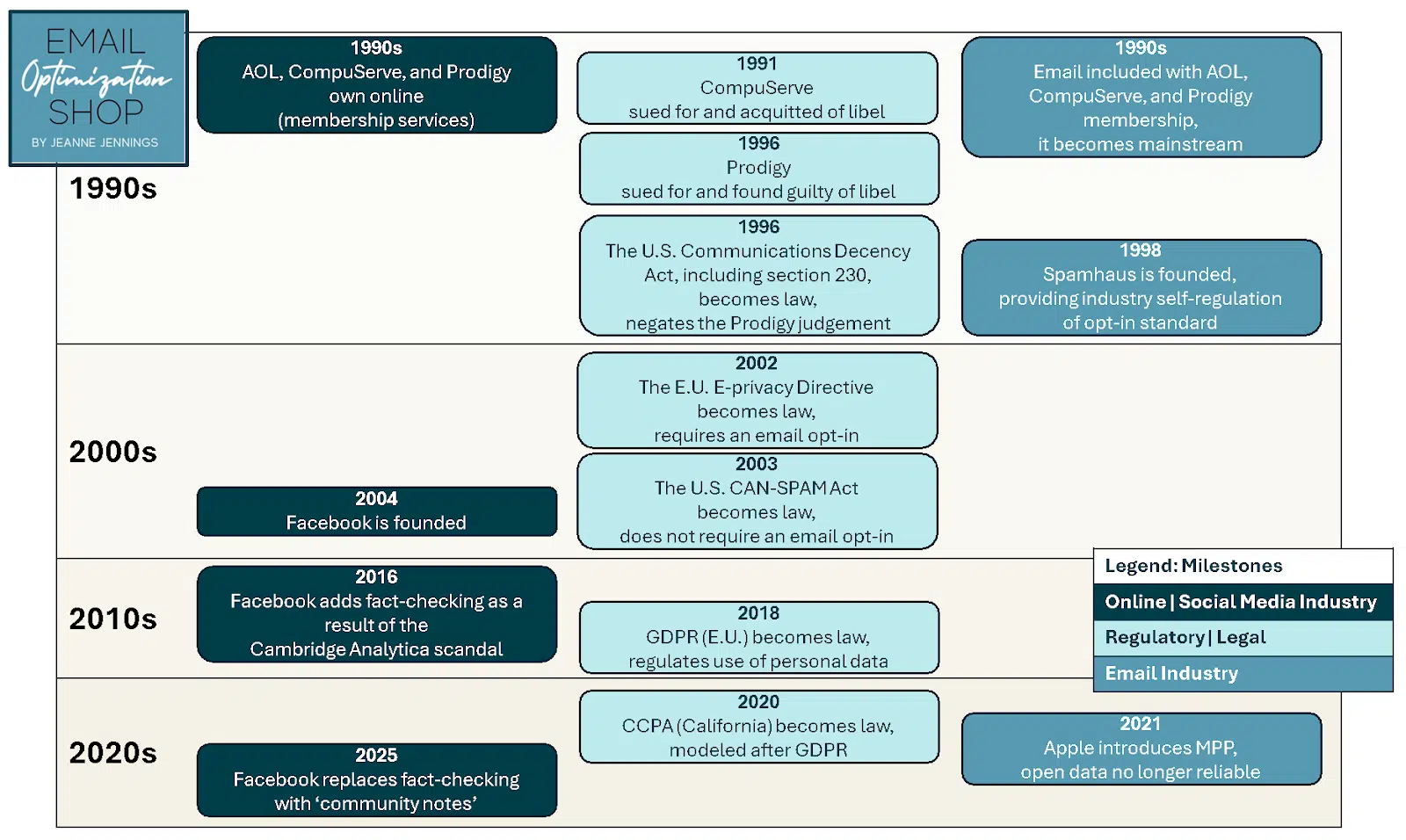Free speech, meta, data privacy and email: a delicate balance or a total disconnect?

Meta’s recent decision to move from fact checkers to an X-like community ratings model highlights a growing divide in how digital platforms handle free speech and content moderation. This highlights a deeper disconnect between digital channels. These divergent approaches to moderation, combined with growing data privacy concerns, pose significant challenges for marketers and consumers.
At the heart of this question is a critical tension: how do we balance the principles of free speech with the need for trust and accountability? How can consumer demands for data privacy coexist with the realities of effective digital marketing? These unresolved questions highlight a divide that could fundamentally reshape the future of digital marketing and online trust.
Context: a timeline
To understand the current situation, it helps to review how we got here. Below is a timeline of notable events in social media, email marketing, and regulatory/legal/restrictive events since the 1990s.

CompuServe, Prodigy, Meta and Section 230
In the early 1990s, online platforms like CompuServe and Prodigy faced major legal challenges regarding user-generated content. CompuServe was acquitted of defamation in 1991 on the grounds that it acted as a neutral distributor of content, much like a platform in a public square. Prodigy, however, was found liable in 1996 because it had proactively moderated content, positioning itself more like a publisher.
To address these conflicting decisions and preserve innovation on the Internet, the U.S. government passed the Communications Decency Act of 1996, including Section 230, which protects platforms from liability for user-generated content. This allows platforms like Facebook (founded in 2004) to thrive without fear of being treated like publishers.
Fast forward to 2016, when Facebook faced public scrutiny over its role in the Cambridge Analytica scandal. At the time, CEO Mark Zuckerberg acknowledged the platform’s liability and introduced fact-checking to combat misinformation.
Yet in 2025, Meta’s new policy shifts responsibility for content moderation to users, citing Section 230 protections.
Email marketing, blocklists and self-regulation
Email marketing, one of the first digital channels, has taken a different path. By the late 1990s, spam threatened to overwhelm inboxes, prompting the creation of blocklists like Spamhaus (1998). This allowed the industry to effectively self-regulate, preserving email as a viable marketing channel.
The CAN-SPAM Act of 2003 established basic standards for commercial emails, such as requiring unsubscribe options. Yet it has failed to meet the proactive opt-in requirements required by the 2002 EU Electronic Privacy Directive and by US blocklist providers. Email marketers widely adopted opt-in standards to build trust and protect channel integrity, and the industry continued to rely on blocklists in 2025.
GDPR, CCPA, Apple MPP and Consumer Privacy
Growing consumer awareness of data privacy has led to the adoption of landmark regulations such as the EU’s General Data Protection Regulation (GDPR) in 2018 and California’s Consumer Privacy Act (CCPA) in 2020 These laws gave consumers greater control over their personal data, including the right to know what to do. what data is collected, how it is used, have it deleted and refuse its sale.
While GDPR requires explicit consent before data collection, CCPA offers fewer restrictions but emphasizes transparency. These regulations have posed challenges for marketers who rely on personalized targeting, but the industry is adapting. However, social platforms continue to rely on implicit consent and broad data policies, creating inconsistencies in the user experience.
Then, in 2021, Apple introduced Email Privacy Protection (MPP), which made email open rate data unreliable.
Dig Deeper: US State Data Privacy Laws: What You Need to Know
Regards
Consumer concerns and compromises
As consumers increasingly demand control over their data, they often ignore the trade-off: less data means less personalized and less relevant marketing. This paradox puts marketers in a difficult position, as they must balance privacy and effective outreach.
The Value of Moderation: Lessons from Email Marketing and Other Social Media Platforms
Without blocklists like Spamhaus, email would have become a reservoir of spam and scams, rendering the channel unusable. Social media platforms face a similar dilemma. Fact-checking, while imperfect, is essential to maintaining trust and friendliness, especially in an era where misinformation erodes public trust in institutions.
Likewise, platforms like TikTok and Pinterest seem to avoid these moderation controversies. Are they less politically charged or have they developed more effective fact-checking strategies? Their approaches offer potential lessons for Meta and others.
Technology as a solution, not an obstacle
Meta’s concerns about false positives during fact-checking reflect challenges email marketers have faced in the past. Advances in AI and machine learning have significantly improved spam filtering, reducing errors and preserving trust. Social platforms could adopt similar technologies to improve content moderation rather than shirk their responsibilities.
Dig Deeper: Marketers, it’s time to take action for responsible media
Overview: what are the issues?
Imagine a social media platform overwhelmed by misinformation due to inadequate moderation, combined with irrelevant marketing messages from limited data caused by strict privacy policies. Is this the kind of place you would choose to spend your time online?
Misinformation and privacy issues raise crucial questions about the future of social media platforms. Will they lose user trust, like X did after rolling back content moderation? Will platforms that moderate only the most egregious misinformation become echo chambers of unverified content? Will the lack of relevance have a negative impact on the quality of digital marketing and the revenue of these platforms?
Fix disconnection
Here are some concrete steps that can help reconcile these competing priorities and ensure a more cohesive digital ecosystem:
Unified standards across all channels: Establish baseline standards for privacy and content moderation across all digital marketing channels.
Proactive consumer education: Educate users on how data and content are managed across platforms and the pros and cons of strict data privacy requirements. Give consumers information and more than all-or-nothing options on data privacy.
Using AI for moderation: Invest in technology to improve accuracy and reduce content moderation errors.
Encourage alignment of global regulations: Pre-emptively align with stricter privacy laws, like GDPR, to future-proof your operations. The U.S. Congress has failed to do so, even though states are passing laws on these issues.
To secure the future of digital social spaces, we must address the challenges of freedom of expression and data privacy. This requires collaboration and innovation across the industry to build trust with users and continue to deliver a positive online experience across all channels.
Dig Deeper: How to Balance ROAS, Brand Safety, and Suitability in Social Media Advertising
Contributing authors are invited to create content for MarTech and are chosen for their expertise and contribution to the martech community. Our contributors work under the supervision of the writing and contributions are checked for quality and relevance to our readers. The opinions they express are their own.



